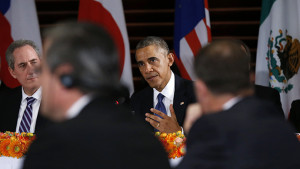It’s highly unlikely that anyone would be surprised to find that Washington is entirely dependent on US financial and military circles,circles that treat elected officials as their servants to allow them to plunder other countries and peoples. These circles have brought US President Barack Obama to power and are now investing huge sums in the election campaigns of both presidential candidates seeking to replace him.
It is therefore only natural that these circles demand their “political puppets” pursue the financial schemes that were elaborated on even before these politicians are brought to power. The ultimate goal of such schemes is the signing of international agreements, that would secure America’s dominant position in trade and finance, allowing US special interests to pursue self-enrichment further still.
This is illustrated through such schemes as the the Trans-Pacific Partnership Agreement (TTP), which was signed last February by the 12 member states of the Asia-Pacific Economic Cooperation Forum: Australia, Brunei, Vietnam, Canada, Malaysia, Mexico, New Zealand, Peru, Chile, Singapore, Japan and the US. It comes as no surprise that the United States was the initiator of this agreement, since Washington has been fairly concerned about its diminishing impact on the situation in the Asia-Pacific region, the strengthening economic and political influence of China, the chance of the Regional Comprehensive Economic Partnership (RCEP) being signed and the failure of the Free Trade Area for Americas (FTAA). For the US, the TTP – a real tool for creating a long-term Free Trade Area for Asia Pacific (FTAAP) that must secure US dominance in the region. However, the TTP still has to be ratified by all the states that signed it. And the chances of this are pretty slim, since there’s growing public awareness in these states that the agreement will only benefit American corporations, so it’s unlikely that President Obama will be able to get the agreement approved by Congress before he leaves office.
In addition, the US has also been negotiating the Transatlantic Trade and Investment Partnership (TTIP) with the European Union, which was to be signed before the end of the year. The total value of this deal, which has been in negotiations for three years, is estimated to be 34.2 billion dollars. But the negotiations are now stalled, since European officials faced harsh public resistance, with Europeans convinced that this deal will give too much preference to US companies.
Both the TTP and TTIP are being created with the sole purpose of establishing US control over international financial flows, which would allow the Wall-Street to gets its hands on one half all trade in the world. The dominant role of the US in these two associations may allow Washington to maintain its dominance over the world,especially if the free trade agreement between Japan and the EU is to be signed, allowing it to establish a staggering level of control over 80% of all international trade, creating an alternative to the WTO, where the United States will dictate the rules of the game.
But the problem is that these two agreements are unlikely to be finalized any time soon, if ever. Therefore, Wall-Street is pushing forward yet another agreement on the table – the Trade in Services Agreement (TiSA). There’s hardly any information available to the general public about this deal, since Washington is trying not to repeat the mistakes it has made with the TTP and TTIP, preventing the international community from raising the alarm before the deal is finalized.
CNN Money would report (emphasis added):
The US is negotiating a trade deal that’s worth 38.5 trillion dollars and spans 50 countries – and most people have never heard about it.
The Trade in Services Agreement (TiSA) has been in the works since April 2013 and it could soon become America’s most important trade deal. The deal encompasses every sphere of public life, from tourism to communication and finance, since such services are becoming increasingly important to the US economy, producing three quarters of the American GDP. It’s been reported that the Office of the United States Trade announced that the 50 nation deal would make the US much richer.
The group of countries that are supposed to sign the deal is calling itself “Really Good Friends of Services.” It includes all EU member states, the US, Australia, Canada, Mexico, Turkey , Korea, Japan and 15 other countries, making this new initiative the largest trade deal in the world, since they represent nearly 70% of the world’s 55 trillion dollar services market. The agreement is negotiated in utmost secrecy, but WikiLeaks has still managed to release a series of secret TiSA documents in mid-September, exposing Washington’s reasoning behind this deal. The Global Justice Now group that was formed to oppose the deal has launched a campaign to raise public awareness, stressing the fact that TiSA poses a threat to Europe’s public services like healthcare and education, since it opens the door to their privatization.
The ancient Latin proverb says: “Beware of Greeks bearing gifts” (Timeo Danaos et dona ferentes) can be easily changed these days to “Beware of Washington proposing trade deals”, since every time a deal like this surfaces, the ultimate losers are always the people of the states that sign it.
Martin Berger is a freelance journalist and geopolitical analyst, exclusively for the online magazine “New Eastern Outlook.”
